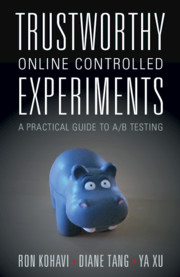Book contents
- Trustworthy Online Controlled Experiments
- Reviews
- Trustworthy Online Controlled Experiments
- Copyright page
- Contents
- Preface
- Acknowledgments
- Part I Introductory Topics for Everyone
- Part II Selected Topics for Everyone
- Part III Complementary and Alternative Techniques to Controlled Experiments
- 10 Complementary Techniques
- 11 Observational Causal Studies
- Part IV Advanced Topics for Building an Experimentation Platform
- Part V Advanced Topics for Analyzing Experiments
- References
- Index
11 - Observational Causal Studies
from Part III - Complementary and Alternative Techniques to Controlled Experiments
Published online by Cambridge University Press: 13 March 2020
- Trustworthy Online Controlled Experiments
- Reviews
- Trustworthy Online Controlled Experiments
- Copyright page
- Contents
- Preface
- Acknowledgments
- Part I Introductory Topics for Everyone
- Part II Selected Topics for Everyone
- Part III Complementary and Alternative Techniques to Controlled Experiments
- 10 Complementary Techniques
- 11 Observational Causal Studies
- Part IV Advanced Topics for Building an Experimentation Platform
- Part V Advanced Topics for Analyzing Experiments
- References
- Index
Summary
Why you care: Randomized controlled experiments are the gold standard for establishing causality, but sometimes running such an experiment is not possible. Given that organizations are collecting massive amounts of data, there are observational causal studies that can be used to assess causality, although with lower levels of trust. Understanding the space of possible designs and common pitfalls can be useful if an online controlled experiment is not possible.
- Type
- Chapter
- Information
- Trustworthy Online Controlled ExperimentsA Practical Guide to A/B Testing, pp. 137 - 150Publisher: Cambridge University PressPrint publication year: 2020

